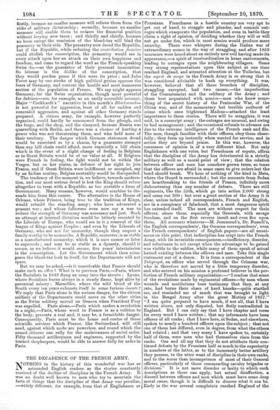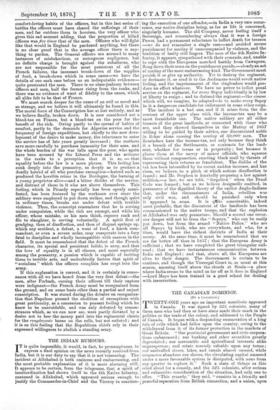THE DECADENCE OF THE FRENCH ARMY.
NOTHING in the history of this wonderful war has so astounded English readers as the stories constantly received of the decline of discipline in the French Army. It was no doubt well known to men who try to ascertain the facts of things that the discipline of that Army was peculiar, —widely different, for example, from that of Englishmen or Prussians. Frenchmen in a hostile country are very apt to get out of hand, to straggle and plunder, and commit out- rages which exasperate the population, and even in battle they claim a right of opinion, of deciding whether they will or will not go under fire, which in most armies would produce mere anarchy. There were whispers during the Italian war of extraordinary scenes in the way of straggling, and after 1859 murmurs were heard about an entirely new evil having made its appearance,—a spirit of insubordination in home cantonments, leading to outrages upon the neighbouring villagers. Some very strong representations upon this subject at one time reached England, and attracted attention at the Tuileries, but the esprit de corps in the French Army is so strong that it was considered advisable to hush up everything. It was, however, believed that all these breaches of discipline, straggling excepted, had two causes,—the imperfection of the Commissariat and the celibacy of the Army ; and those best acquainted with armies—men who knew some- thing of the secret history of the Peninsular War, of the China war, and of the momentary but terrible outburst of crime which once frightened Madras—attached the least importance to these stories. There will be stragglers, it was said, in a conscript army ; the outrages are unusual, and owing to bad management ; and the occasional refusals to advance are due to the extreme intelligence of the French rank and file. The men, though familiar with their officers, obey them cheer- fully ; they form up instantly when wanted for service, and in action they are beyond praise. In this war, however, the consensus of opinion is of a very different kind. Not only Englishmen with one voice, but Frenchmen of repute, affirm that the discipline of the Army has deteriorated in a strictly military as well as a moral point of view ; that the relation between officer and man has somehow grown tense, so tense that the officers are afraid in some cases to give orders lest the bond should break. We hear of nothing of the kind in Metz, where the Guard is surrounded ; but the accounts from Sedan are heartbreaking to the friends of France, infinitely more disheartening than any number of defeats. There are still regiments, like the 55th, which go into action 2,000 strong and come out 300 ; but over a great section of the Army it is clear, unless indeed all correspondents, French and English, are in a conspiracy of falsehood, that a most dangerous spirit has extended itself. The men are without respect for their officers, abuse them, especially the Generals, with savage freedom, and on the first reverse insult and even fire upon them. All accounts whatever—M. Jeannerod's, Dr. Russell's, the English correspondents', the German correspondents', even the French correspondents' of English papers—are all unani- mous on this point, that indiscipline has crept into the French Army, with its invariable consequences,—inefficiency, disorder, and reluctance to act except when the advantage to be gained was visible to the soldier, while many of them speak of actual hatred existing between the officers and men. Take this single statement out of a dozen. It is from a correspondent of the Telegraph, an officer who served through the Crimean war, who is therefore not moved by a little temporary disorder, and who entered on his mission a profound believer in the per- fection of French military organization:—"I confess that some of the revelations made by regimental officers—by men whose wounds and mutilations bore testimony that they, at any rate, had borne their share of hard knocks—quite startled me, and reminded me of much that was brought to light in the Bengal Army after the great Mutiny of 1857." "I am quite prepared to have much, if not all, that I have written above, not only disputed, but flatly contradicted in England. But I can only say that I have chapter and verse for every word I have written ; that my informants have been officers of all ranks ; that I have here, at Sedan, and elsewhere, spoken to nearly a hundred officers upon the subject ; that not one of them has differed, even in degree, from what the others had related ; and that very many I have spoken to, certainly half of them, were men who had themselves risen from the ranks. One and all say that they do not attribute their con- tinued defeats by the Prussians half so much to the superiority in numbers of the latter, as to the immensely better artillery they possess, to the utter want of discipline in their own ranks, and to the worse than incompetence of most of their General officers, particularly of those commanding cavalry brigades or divisions." It is, not mere disorder or laxity to which such descriptions as these can apply, but actual disaffection, a discord between officers and men which must have some deep moral cause, though it is difficult to discern what it can be. Early in the war several complaints reached England of the
comfort-loving habits of the officers, but in this last series of battles the officers must have shared the sufferings of their men, and far outdone them in heroism, the very officer who gives this sad account adding, that the proportion of killed officers was five times that of the men. Officers who will fight like that would in England be pardoned anything, but there is no clear proof that in the average officer there is any- thing to pardon. The General officers are accused in many instances of misbehaviour, or outrageous negligence, but no definite charge is brought against the subalterns, who are not responsible for the most persistent of all the French failures, the incessant break-down of the supplies of food, a break-down which in some cases—we have the details of one such case before us on indisputable evidence— quite prostrated the men. There is no class-jealousy between officers and men, half the former rising from the ranks, and there was no evidence of want of fidelity to the cause, which all alike felt to be that of France.
We must search deeper for the cause of an evil so novel and so strange, and we believe it will ultimately be found in this. The moral force of the Conscription has at last entirely, and as we believe finally, broken down. It is now considered not a blood-tax on France, but a blood-tax on the poor for the benefit of the rich. Owing partly to the spread of habits of comfort, partly to the demands for Algerine service and the frequency of foreign expeditions, but chiefly to the new deve- lopment of the desire to make money, the reluctance to enter the service has of late years greatly increased ; the mothers save more carefully to purchase immunity for their sons, and the whole burden of the war falls upon the poor, who again have been aroused by the Liberal Press and the artizans in the ranks to a perception that it is so, — that equality before the law is a mere phrase. This feeling has sunk deeply into the peasantry, so deeply as to produce a deadly hatred of all who purchase exemption—hatred such as produced the horrible crime in the Dordogne, the burning of a young proprietor alive—and a bitter dislike of the service, and distrust of those in it who are above themselves. This feeling, which in Picardy especially has been openly mani- fested, has been fostered by the workmen ever since the soldiery were employed to put down strikes, and though quiet in ordinary times, breaks out under defeat with terrible violence. Then, the conscript remembers that he is serving under compulsion, while the rich are exempt, and while his officer, whose mistake, as his men think, exposes rank and file to slaughter, is serving voluntarily. A spirit first of grudging, then of disaffection, and then of disgust springs up, which any accident, a defeat, a want of food, a harsh com- mandant, or even a severe order, may exasperate into a fury fatal to discipline and wholly incompatible with success in the field. It must be remembered that the defect of the French character, its special and persistent foible, is envy, and that the love of equality is in all classes, and more especially among the peasantry, a passion which is capable of inciting them to terrible acts, and undoubtedly fosters that spirit of "socialism " which the officers complain has crept into the army.
If this explanation is correct, and it is certainly in conso- nance with all we have heard from the very first defeat—the men, after Forbach, cursing their officers till their captors were indignant—the French Army must be reorganized from the ground, and on some basis other than a partial and unjust conscription. It was stated during the debates on reorganiza- tion that Napoleon pressed the abolition of exemptions with great pertinacity, as a concession to peasant feeling which he knew to be unavoidable, and was only defeated by remon- strances which, as we can now see, were partly dictated by a desire not to lose the money paid into the regimental chests for the remplacants borne on the rolls, but not enlisted ; and it is on this feeling that the Republican chiefs rely in their expressed willingness to abolish a standing army.































 Previous page
Previous page